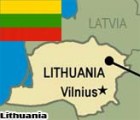Lithuania ready for a reassuringly normal election
 Vilnius - Lithuanians go to the polls Sunday to vote in a general election. But this year's campaign is proving to be very different from the ones that preceded it.
Vilnius - Lithuanians go to the polls Sunday to vote in a general election. But this year's campaign is proving to be very different from the ones that preceded it.
Where previous general elections have usually been boisterous, affairs featuring flamboyant politicians making often outrageous statements at colourful rallies, this year's campaign has been uncharacteristically calm.
"For the first time in many years, the campaign isn't actually that interesting. Nothing unexpected has happened and there are no new faces on the political scene. The distribution of political force is more or less the same as it was one, two or even three years ago," Vladas Gaidys, director of Vilnius-based polling company Vilmorus told Deutsche Presse-Agentur dpa on Friday.
The reason for the change is new legislation governing how, where and when political parties can campaign, now that they are funded from the public purse instead of the deep pockets of shadowy power brokers.
"The main purpose was to cut the relation between big money and getting more votes. It has been quite successful, but it also means this year's campaign has been less exciting. There isn't the atmosphere of a political feast that there was earlier," Gaidys said.
According to a Vilmorus poll, the opposition Conservative Party has a narrow lead and could become the largest single party in the Seimas, the Lithuanian parliament.
However, that is no guarantee of being able to form a government, thanks to a complex political system that mixes proportional representation with majority voting which makes coalition rule almost inevitable.
"It is possible to expect six or seven parties in the next parliament. There isn't a clear leader the way there was four or eight years ago," said Gaidys.
That view is shared by Bryan P Bradley of the Baltic Management Institute, based in Vilnius. "I don't get the sense that there's a lot of enthusiasm among the electorate," he told dpa.
"The polls suggest that the next parliament will probably be similar to the current one. There's been little that has really grabbed my attention other than that you tend to see very different posters in the town and the country.
"In Vilnius the Social Democrats of (incumbent Prime Minister Gediminas) Kirkilas seem to have more posters while in the countryside the Liberal Democrats of (former President Rolandas) Paksas seems to be drumming up support."
The downbeat atmosphere has been accentuated by signs that the Lithuanian economy is undergoing a marked slowdown after years or breakneck growth.
Additionally, there are fears over the future of the country's Ignalina nuclear power plant, which is due to be shut down during the life of the next parliament. Lithuanians fear that could lead to energy supply problems.
Such is the level of concern about Ignalina's future that Sunday's vote will be accompanied by a referendum asking if the Soviet-era nuclear plant should be kept open beyond 2009, in defiance of a Lithuanian agreement with the European Union.
Despite this, Lithuanians are unlikely to yearn for a return to the entertaining chaos of the past, Gaidys said.
"Maybe this means that our political system is now more or less normal," he said. (dpa)